Gen Z’s bathing care in China’s elder homes
"He said what we do isn’t just 'taking care of people,' but really keeping them company and preserving their dignity."
I was genuinely surprised by how warmly you received my last piece about the midday napping habits of people in Shanxi. While I knew it was a fun topic, I didn’t expect it to resonate with so many of you. Some readers even wrote in to share siesta traditions from their own countries — it turns out China isn't alone when it comes to taking naps!
Today’s story shifts from naps to something more intimate and equally human. It's told in the first person by Ba Linya, a young Chinese caregiver born after 2000, who has spent the past three years working in an elderly care facility in Nanning, Guangxi Province, assisting seniors with bathing. Over 1,000 times, she has helped more than 60 elderly residents — many of whom are well into their 80s or 90s and often face physical or verbal communication challenges — with this deeply personal and physically demanding task.
In China, most professional bath assistants are still women, even though the elderly population needing help includes both men and women. The job demands care, patience, and sensitivity — every case is different. And while automation is advancing rapidly, this kind of intimate, individualized care still seems far beyond the reach of robots.
With China’s population aging at an accelerating pace — a fact well known but still daunting — stories like this feel increasingly urgent. Elder care is not just a domestic issue; it’s a shared global challenge that deserves more attention, reflection, and compassion.
The story was first published on 极昼工作室 [Media-Fox], a WeChat blog affiliated with the portal giant Sohu.com. If you have a WeChat account, you can also watch the video version of the story embedded in this article.
I gave an elderly person a bath for the first time a week into my internship. She was 89, a retired primary school teacher. We all called her Miss Wen.
It was June, and the heat in Nanning was already in full swing. She’d just moved in, wearing a corduroy jacket over a knitted vest and a long-sleeved shirt underneath. Her sense of temperature had dulled—she didn’t feel hot, but she was soaked in sweat. She hadn’t bathed in a month. Her daughter explained that she had several chronic conditions, and the family worried that forcing the issue might upset her and spike her blood pressure. So when she refused to bathe, they just let her be.
I asked her gently, “Grandma, it’s been a while since your last bath. Would you like to take one now?” She immediately bristled: “Don’t accuse me! Who said I haven’t bathed in a month?” I quickly backtracked, “Of course, of course. You have.” Later, we made small talk about family and life just to help her ease up. Once she seemed more at ease, I tried again, “You’ve been sweating quite a bit. How about a quick rinse?” Only then did she reluctantly agree.
Before helping with the bath, Ba Linya makes sure to pull the curtains closed in the elder’s room.
Each resident here has their own bathroom, about three square meters, give or take. Most of the elderly folks are still pretty mobile, so usually I just help them onto the shower stool, turn on the water, and rinse them off gently. Miss Wen, though, wasn’t as steady. She relied on a wheelchair and a walker to get around. I wheeled her into the bathroom and started getting her undressed.
I was so nervous, especially with her daughter standing right there. Miss Wen liked to stash away leftover food, and while I was helping her change, she even pulled half a steamed bun out of her pocket. Some parts of her skin were yellowed and coated with a layer of grime which took slow, careful wiping to clean. She told me she usually just rinsed off at home and didn’t really let people scrub her. It took a lot of gentle coaxing before she finally agreed.
At first, the smell, a mix of sweat, old clothes, and something else I couldn’t quite place, was hard to get used to. But I had to keep a straight face. Halfway through, she started chatting with me. Her daughter, standing outside the bathroom, kept thanking me and saying how much she appreciated the effort. That helped me ease up a little. When it was all done, I was stunned. It was the first time it really hit me: this is what it means to grow old.
Helping the elder get ready for their bath.
Ba Linya giving a sponge bath to a bedridden elder.
I’m 23 and have been working as a bathing assistant at a nursing home in Nanning for three years. Honestly, back in high school, I wanted to be a flight attendant. I thought it looked so cool how they handled emergencies on those TV shows. But during my senior year, the pandemic hit and our physical classes got canceled. Plus, my parents thought it wasn’t a safe path. I wasn’t great at all my subjects either, so my homeroom teacher suggested I try vocational school and told me about a program in elder care.
At first, I didn’t really know what elder care involved. When I got the acceptance letter, I wasn’t sure if it was for me. What convinced me was hearing from an older student that the program had great job prospects. I figured learning a practical skill wouldn’t hurt.
Once I started my internship here, I did a bit of everything. Now, I mainly work on the sixth floor of the care building, helping six or seven seniors with their baths every day. I usually start by chatting with them to help them relax, then wash their hair, clean their bodies, and give them a back scrub. Baths usually take around 20 to 30 minutes.
An elder waiting for her bath.
I’ve had seniors accidentally pee during their baths, which means having to clean both their bodies and the bathroom multiple times. Some elders with cognitive issues get really scared of the showerhead and can get anxious, even grabbing onto my clothes tightly. It’s especially awkward when I’m bathing male elders. Most of them resist at first, even those who can’t care for themselves still feel uncomfortable exposing their bodies to a stranger.
The day after I helped Miss Wen, I was assigned to a big, sturdy grandpa. He was about 1.8m tall and weighed around 70kg. I’m pretty small, so there was no way I could manage him alone. I had to ask for help, while I supported him from behind, another person helped from the front to move him from his wheelchair onto the shower stool.
Helping him undress, I felt my face flush with embarrassment, even through my mask, my ears were burning. He was shy too, especially when it came to taking off his pants. He kept covering himself with his hands. I grabbed a towel to cover his legs and gently told him, “If you feel shy, just close your eyes, I won’t look. I’ll be careful and slow.”。
During the whole bath, I kept the towel over him. He held his hands down tight and muttered softly—he had trouble speaking clearly and was hard of hearing, but I knew he was embarrassed. I spoke up, “We’ve got to get you clean, or there’ll be a smell.” He nodded but kept tugging the towel, not wanting me to move.
During the bath.
Helping an elder dry his feet after the bath using a hairdryer.
After helping with baths for a while, I stopped feeling so awkward. I’d crack a joke to lighten the mood, then hand them a glass of water when I was done. The elders really appreciated the respect, and that made them much more willing to cooperate. These little touches might seem small, but for them, it’s all about preserving their dignity, and they definitely notice.
Some seniors with dementia don’t really get why they need to bathe. When you help them undress, they might think you’re trying to hurt them. Take Xiao Hui, who was 88 and living here when I started my internship, I’ve known her for three years now. But because she has Alzheimer’s, she doesn’t remember me.
At first, bathing her was pretty easy. If I said, “Time for a bath,” she’d check the clock and say, “It’s only noon, no way. I’ll bathe tonight before bed.” We’d go along with it, and come evening, she’d quietly follow me to the bath. But as her condition got worse, she started resisting more. The dementia made her scared of bathing. She’d get agitated and sometimes even hit or kick.
I tried all sorts of ways to handle it, including little white lies. Her daughter works in Hong Kong, and her son runs a business overseas. She can’t remember her late husband but does remember her kids. So I’d say, “Your daughter’s coming to visit and bought you some new clothes to wear.” As soon as she heard that, she got excited to see her daughter. I’d quickly suggest she use the bathroom first, and while she was inside, I’d get the bathwater ready.
Ba Linya and her colleague convincing Xiao Hui to take a bath.
She had a strong panic reaction whenever water was involved. The second I turned on the shower, she grabbed my collar, snatched the showerhead, and sprayed water right in my face, yelling at me to get out. So I purposely let some water soak her clothes and said, “See? Your clothes are wet now, you better change.” Washing her hair was the toughest part. I had to get the water ready beforehand, scrub quickly, then cover her eyes with a towel while rinsing. She spat at me, swung her cane to push me away, and even pinched my stomach. I’d often end up bruised and covered in her spit and soap.
Every bath felt like a battle. After it was over, I’d say, “You got my clothes all wet!” She’d just laugh and say, “No way it was me. Since there’s hot water, you should take a bath too.” Then she’d forget all about it right away. It was frustrating but also kind of funny.
One grandpa with dementia scared me to tears once. While helping him undress, he suddenly freaked out, tried to rip my clothes, and shouted, “I’m going to wash you first!” A coworker had to come comfort me, and after that, I never helped bathe him again. Another elder touched my hand during a bath, and later his family decided to discharge him.
After going through experiences like that, I felt pretty down. But what hurt even more was how little people outside understood the job. My ex and I had survived four years of a long-distance relationship through college, but we broke up because of this job. I shared all these struggles with him hoping for support, but he just said, “I told you not to do this kind of work.” Some old friends, when they found out what I did, said, “It’s just bathing and washing, any nanny can do that. Why hire a young girl for it?”
During that rough patch, I really doubted myself and even wrote a resignation letter. One time, after helping Grandpa Wenqi, who I’m pretty close with, finish his bath, I just stood by his window, zoning out and not saying a word. Grandpa’s a veteran and incredibly sharp; he immediately noticed and asked, “Hey kiddo, you hiding something from me?”
He’s got this warm, grandfatherly vibe, a chubby, white-haired guy with a big round belly and a gentle smile. He’s got a great sense of humor and always jokes around with me. In his room, he keeps a little fridge stocked with snacks. After every bath, he’d pull some out for me and even peel and core apples, washing them carefully before handing them over. He’s 94 but treats me like his own granddaughter.
Ba Linya helping Grandpa Wenqi taking a bath.
When Grandpa Wenqi first came here, he felt pretty lonely. His kids weren’t around, and everything was so different. He mostly kept to his room during the day and didn’t want to join any activities. One time while I was helping him bathe, he said, “I’m already 94. I don’t know when I’ll go, maybe this is my last stop.”
That really hit me. I tried to encourage him not to think like that. After every bath, I’d stay and chat with him, even sing a little. We added each other on WeChat. I love taking photos, so sometimes I’d send him pictures of flowers and plants. He actually knew I was planning to leave: “You’re lying to me. When I was so lonely, you were there for me. If you’re feeling down, how am I supposed to help?”
Ba Linya putting body lotion on Grandpa Wenqi after his bath.
Ba Linya chatting with Grandpa Wenqi.
That day, I poured out all my frustrations, and Grandpa reassured me. He said what we do isn’t just “taking care of people,” but really keeping them company and preserving their dignity. “Honestly, I don’t want you to leave, but for your own future, I hope you go on to better things.”
I slowly pulled myself together and decided to stay. When others looked down on me, it just made me want to prove them wrong even more. Honestly, I grew attached to some of the elders. On our floor, there were retired university psychology professors and high-ranking officials. Whenever I had a problem, I’d turn to them for advice. It was really a two-way support system.
Last year on my birthday, I casually mentioned it to Grandma Wei, but she remembered. Usually, she goes to bed by 8 p.m., but that night she stayed up past 10 waiting. I didn’t even know. My shift ended around 8:30, and I was waiting for the cake delivery.
Later, we cut the cake in the staff lounge with seven or eight elders and coworkers. Grandma Wei’s daughter sent a fresh bouquet of flowers. Grandma Wei insisted on cutting the first slice with me. Holding my hand, she said, “With this cut, I’m passing on my long life to you. Think of it as the start of a new chapter in your life.”
An elder after his bath.
Even Xiao Hui, who has Alzheimer’s, shows her care in her own way. When she sees us working, she asks if we’re cold and insists on giving us her clothes to wear. One night when it got dark, she even dragged a stool over to sit beside us and ended up falling asleep there, refusing to go back to her room. When we covered her with a blanket, she’d pull it off and wrap it around us instead.
She’s always super curious about our snacks. We’d offer her some coffee or milk tea, and she’d say, “Just looking,” but before we knew it, she’d gulp it all down. Spicy snacks? She’d snatch them up and stuff her mouth right away. Once during rounds, I caught her sneaking a sip of my milk tea. After finishing it, she sweetly asked, “Want some?” Older folks love their sweets just like kids do.
Xiao Hui holding a doll in her room.
In my three years at the nursing home, I’ve helped over 60 seniors with bathing, probably more than a thousand times altogether. Sadly, five of them have passed away. The one who sticks with me the most is Grandpa Weiju—94 years old, tall and lean but still sharp as a tack. We’d tease him with photos from his younger days, calling him a real heartthrob. He’d laugh it off, saying, “I’m old now, not handsome anymore,” but there was always a little smile playing at the corner of his mouth.
He used to live in the independent-living area, happily spending his days playing ping-pong and gateball with the other seniors. After his cancer diagnosis, he moved to our floor last June. At first, he was still pretty active and could get around on his own. He always felt a bit shy about having a female assistant help him bathe, so on the rare occasions no male staff were available, I’d step in. Blushing, he’d say, “Alright, just make it quick, okay?”
After a couple of times, he relaxed and joked, “I’m old now, what’s there to be shy about?” He’d often ask where I planned to go during my time off. Once, I told him I was heading to Chongqing to see a Zhang Jie concert. Since he’s from Chongqing, he immediately started giving me travel tips. I told him I was so excited I couldn’t sleep. He laughed and said, “It’s just a singer!” I told him, “Grandpa, you don’t get fangirl fever!” Before I left, he made sure to remind me to stay safe going alone.
Hand of a bedridden elder.
When this grandpa first came in, his skin still looked healthy and rosy. But as his illness got worse, he ate less and less, lost a lot of weight, and his skin slowly turned a pale, waxy yellow. One night during my shift, I was helping him get up when he suddenly started coughing up blood. I freaked out and called the doctor and nurses right away. After the checkup, the doctor said he needed to be transferred to a big hospital for treatment.
In February this year, his daughter came to pick up his things. I watched as they packed up his clothes, alarm clock, and other everyday stuff, one by one. The family group chat for the nursing home was shut down too. His family changed their profile picture to a white butterfly on a black background. Before they left, they told me, “Grandpa has turned into a butterfly and flown away. He’s finally free.”
Before this job, I never really paid much attention to the elderly around me. Helping these seniors bathe every day, seeing them move slower and forget more, sometimes even whether they took their medicines, made me think a lot about my own older family members. There’s one grandma who looks just like my own grandmother, and I can’t help but say hi to her every time I see her.
Hanging clothes out for the elders.
I was raised by my grandparents. My grandpa used to teach at Southwest United University. When I started working, he’d call me all the time to check on me. Back in school, I always thought they were healthy and didn’t really notice how much they were changing.
For the past three years, I’ve spent every Chinese New Year in Nanning with the seniors at the care home. This year, my grandpa suddenly got hospitalized. It was snowing back home in Kunming, and the sudden cold made his breathing worse, he was gasping for air. My family rushed him to the hospital, and he was diagnosed with chronic obstructive pulmonary disease. I was so worried I asked for leave to go back, but once I knew he was okay, I canceled the trip.
Our care facility just opened a new branch in Kunming this year, and my biggest wish is to be closer to my family. Every day, while taking care of other people’s grandparents, I think about how I can walk and chat with them, but can’t do the same for my own.
These next few months will be my last helping with baths in Nanning. By June, I’ll be switching roles. On my last day, I plan to say goodbye to Grandpa Wenqi in person and have a good chat with him. I also want to have a meal with Grandma Yu, who I’m really close to. She’s talked about getting together and taking some photos to remember the good times. Honestly, it’s hard to think about leaving.



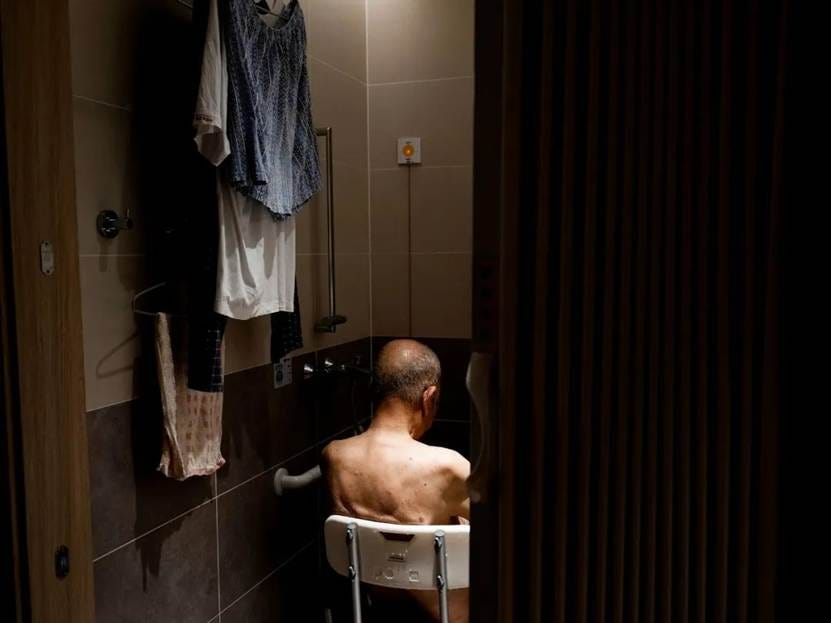
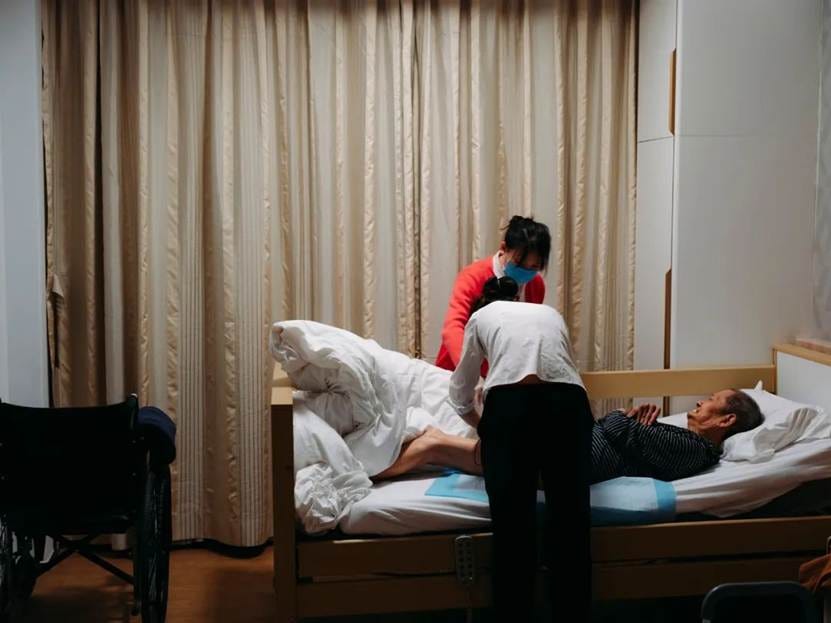
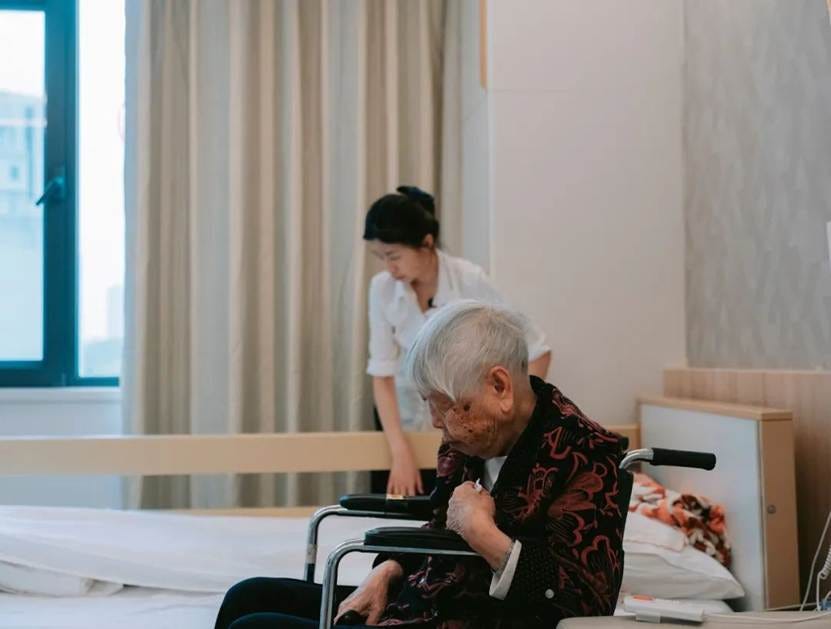
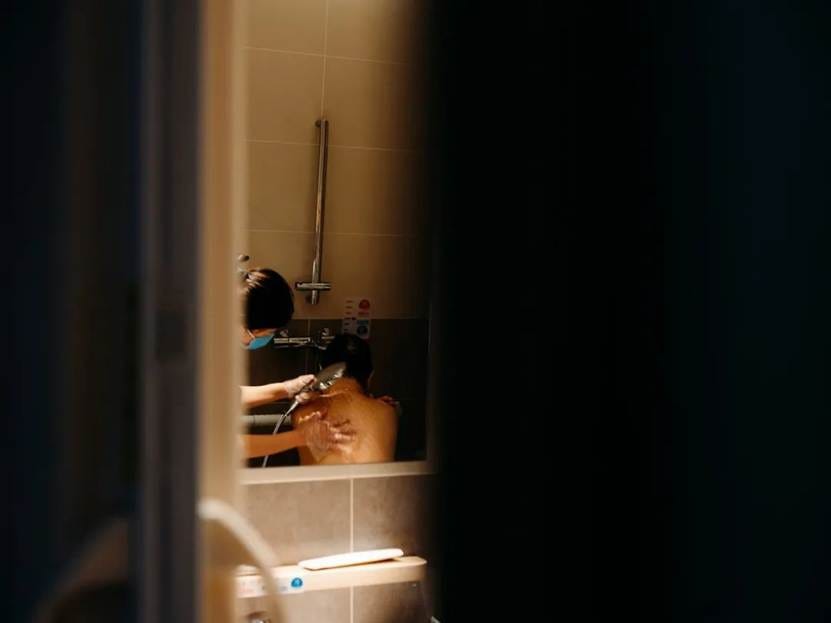

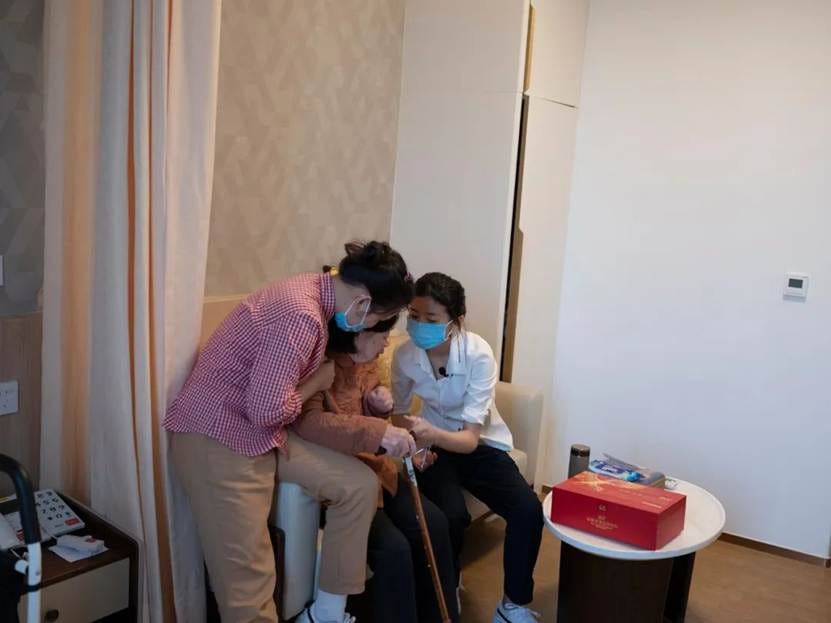
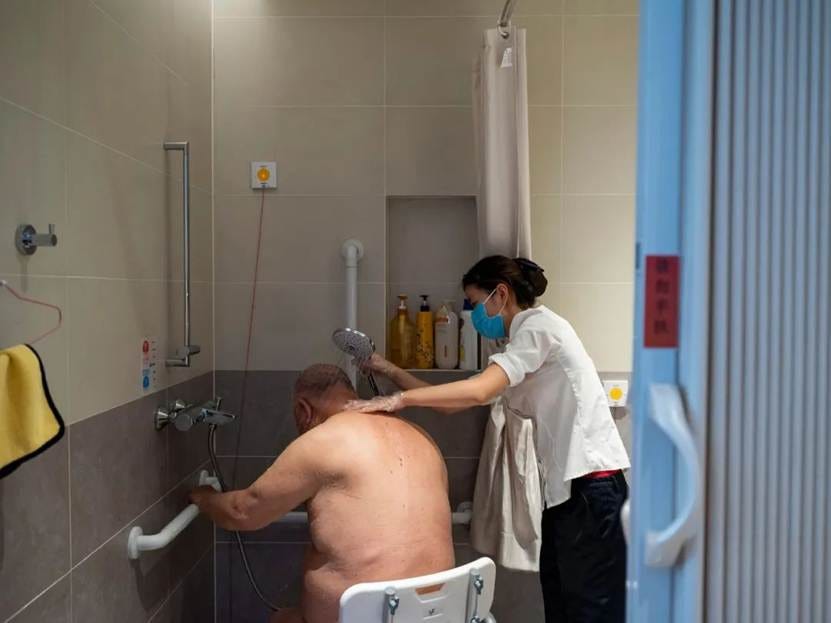

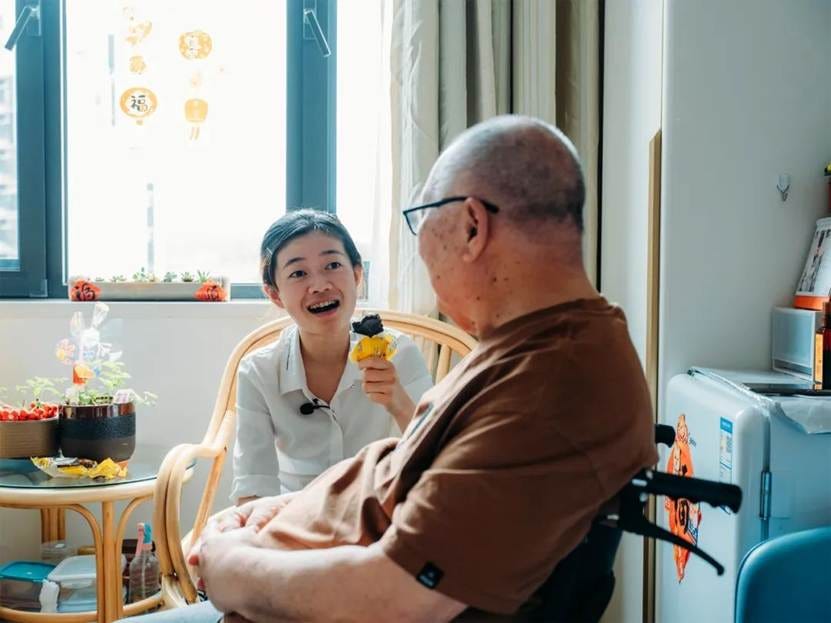

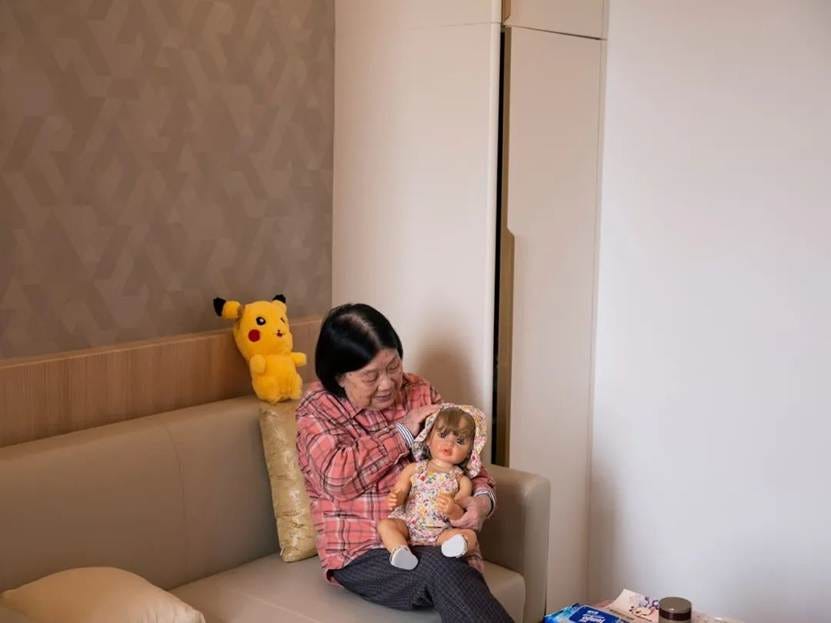
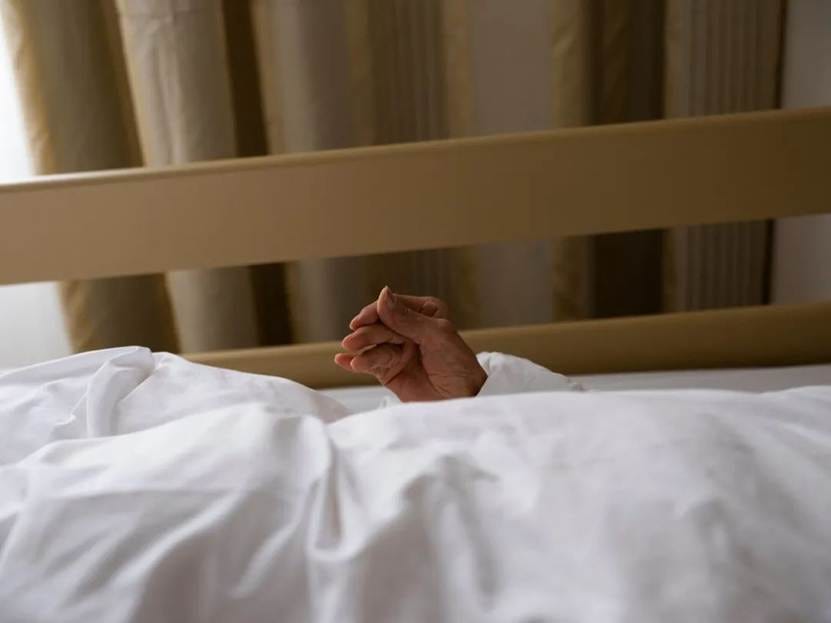
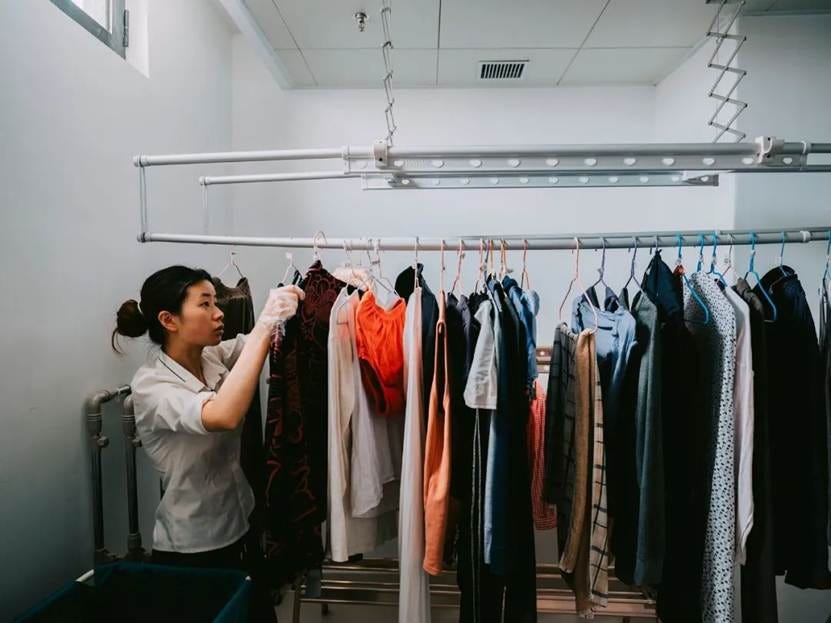
A beautiful and uplifting story, Jiang Jiang! Thank you so much for sharing this with us!
Thank you for allowing us a glimpse into what goes behind the curtains of nursery homes. The photos makes it so real. This touched my heart.